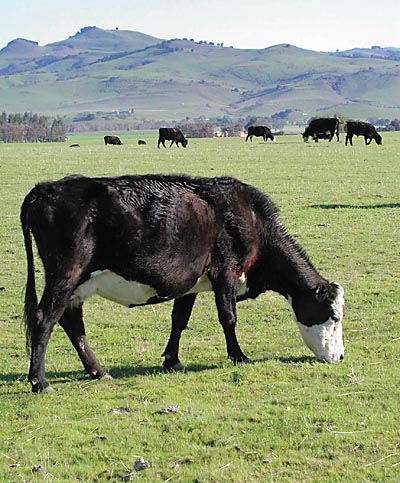
With the discovery of bovine tuberculosis in two California
cattle herds last year, livestock producers
– including those in San Benito County – are facing the likely
loss of the state’s
”
TB-free status
”
for the disease.
The U.S. Department of Agriculture announced in December its
plans to downgrade the state’s TB-free status to
”
Modified Accredited Advanced,
”
which would be official if the USDA publishes the new status in
its Federal Register.
With the discovery of bovine tuberculosis in two California cattle herds last year, livestock producers – including those in San Benito County – are facing the likely loss of the state’s “TB-free status” for the disease.
The U.S. Department of Agriculture announced in December its plans to downgrade the state’s TB-free status to “Modified Accredited Advanced,” which would be official if the USDA publishes the new status in its Federal Register.
That may happen within the next couple weeks, according to a recent report in Ag Alert, a weekly publication for California farmers.
Local farmers who want to ship cattle across the state border would be forced to test those animals for bovine TB. And each animal tested would cost between $5 and $10, according to a report out of the University of California, Davis.
“Some of them (local farms) run a couple thousand cows,” said Tom Manning, president of the SBC Cattlemen’s Association. “So It would be a major expense.”
Several local farmers transport cows to Oregon for grazing during certain months of the year, according to Robert Frusetta, a local cattle farmer and member of the SBC Cattlemen’s Association.
“It may even prevent them from doing that,” he said.
The disease – caused by a contagious germ – hinders the lungs, lymph nodes or organs in the animal’s digestive system. Bovine TB can afflict cattle, bison, deer, elk, goats and even humans, according to a USDA report.
The most recent positive tests occurred in Tulare County, but officials are not sure of the origination.
The SBC cattle industry is valued at more than $14 million and includes more than 41,000 head, according to the latest annual crop report.
California’s cattle industry as a whole is valued at more than $6 billion.
Manning said several local cattle farmers have recently expressed concern about losing the TB-free status.
“A lot of farmers send cattle out of state,” he said. “They’re very concerned about getting the cattle across the California border.”
Through an extensive eradication effort that began in the early 1990s, California earned a TB-free status in 1999. The positive TB tests in 2002 happened in May and September.
A state loses its TB-free status if two or more herds test positive for bovine TB within a four-year period, according to the USDA’s regulations.
The California Department of Food and Agriculture quarantined the involved herds. And all cattle testing positive for TB were slaughtered.
Since May, 152,875 cattle have been tested within the state and nearly 8,000 slaughtered, according to the CDFA.
“If that’s what it takes, then that’s what should be done,” Frusetta said.
He commended the USDA, CDFA and other government agencies for mandatory testing because, he said, such action protects farmers from further spreading of the disease.
“Thank god for USDA and other agencies…” he said.
California, Michigan and Texas are the only states with recent TB diagnoses, according to the USDA. Regaining the TB-free status with the USDA would take at least two years.









